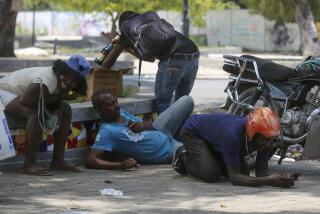Haiti Leader Grilled About Violence on U.S. Visit
- Share via
WASHINGTON — New Haitian President Rene Garcia Preval, visiting Washington on Thursday for his first official meeting with President Clinton, acknowledged a spate of police and political violence in his impoverished Caribbean country but blamed the problems on matters beyond his control.
Although he came to Washington for economic aid, Preval was dogged by questions about violence in his nation. He repeatedly defended the intentions of his inexperienced police force and said he needs more time to deal with investigations of political assassinations.
Violence looms as a major obstacle to Clinton’s promise to provide a $100-million program of foreign aid to Haiti next year. So long as the police continue to fire into crowds and cases of political assassination remain unsolved, Congress will probably be reluctant to appropriate all the money requested. Congress already has frozen $2.5 million that was supposed to help finance the police academy that is turning out new officers.
The persistence of violence is a dispiriting cloud on what the Clinton administration regards as one of its major foreign policy triumphs--the return of democracy to Haiti. For this reason, Preval found the issue raised in his meetings with both Clinton and Deputy Secretary of State Strobe Talbott, according to U.S. officials.
Clinton, welcoming Preval to the White House, said in front of television cameras: “I’m very proud of the progress that Haiti has made in preserving its freedom and liberty and very pleased that, when [Preval] was inaugurated, it marked the first peaceful transfer of power from one democratically elected president to another in 200 years.”
Preval, who succeeded Jean-Bertrand Aristide as president last month, told reporters at a breakfast meeting that it is difficult to solve cases of alleged political assassination because of “a corrupt judicial system and a young and inexperienced police force.” Nevertheless, he said, he has appointed a special judicial unit to investigate the cases and expects a report next month.
The Haitian president, however, cast doubt on the incidence of such assassinations, which some critics insisted have reached 30 since Aristide returned 17 months ago. Preval said, for example, that he is not certain that the most celebrated case--the murder of Aristide opponent Mireille Durocher Bertin last year--was a case of political assassination.
Raising a sore point in U.S.-Haitian relations, Preval said that the investigations of earlier assassinations under military rule probably would be more successful if the Pentagon released the documents that American troops seized from Haitian army headquarters when they landed in Port-au-Prince in September 1994.
Deputy National Security Advisor Samuel Berger told reporters later, “We are taking steps to return those documents.” But he said the U.S. government wants to protect the names of some of the people, including Americans, mentioned in the documents for fear of retribution against them.
Preval said recent incidents in which police fired into crowds could be traced to the inexperience and lack of equipment of the new force of 5,200 police. In all, 19 people have died at the hands of the police in the past eight months. The Haitian president said that fearful young police, lacking helmets, shields, tear gas and water pumps, fired into crowds when subjected to a barrage of stones.
Noting that the crowds had been demonstrating against a weeklong power blackout and a failure to collect garbage, Preval said that the incidents reflected the problems of the devastated Haitian economy.
More to Read
Sign up for Essential California
The most important California stories and recommendations in your inbox every morning.
You may occasionally receive promotional content from the Los Angeles Times.













